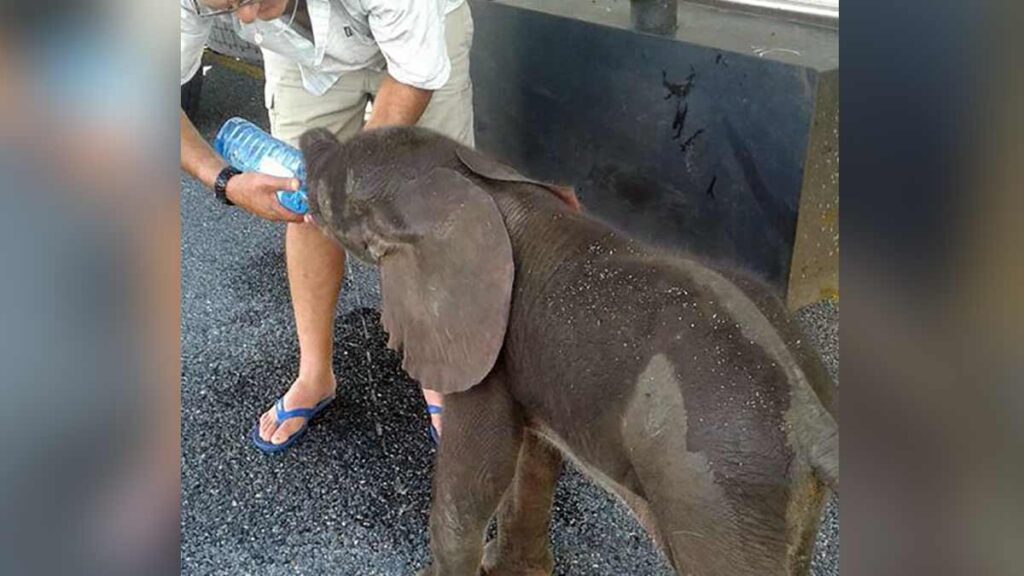In the spring of 2017, imagine a group of South African truck drivers embarking on their usual journey through the scenic landscapes of Botswana. Picture the vast open roads stretching before them, the anticipation of a routine workday filling the air. Little did they know that destiny had a surprise in store for them, a surprise that would transform a mundane drive into an extraordinary adventure.
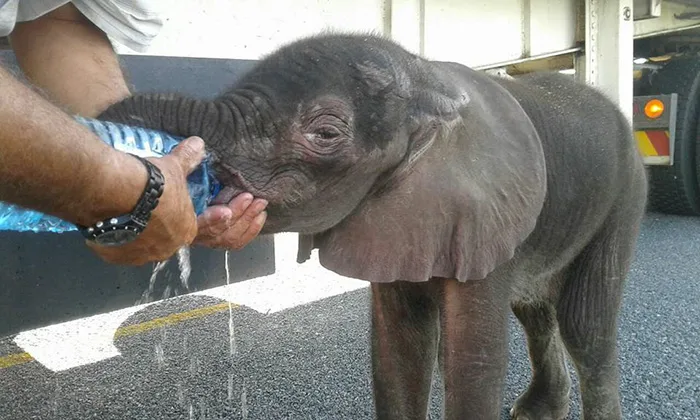
As the convoy of trucks rumbled along, their tires humming a rhythmic tune, a sudden obstacle emerged, a broken bridge blocking their path. What could have been a mere inconvenience turned out to be the gateway to an unexpected encounter with the wild. The truckers, seasoned travelers of these routes, found themselves at a crossroads, both literally and metaphorically.
And then, like a scene out of a storybook, a tiny elephant, no more than three weeks old, appeared on the horizon. A fragile creature, alone and abandoned, stood in the way of the truckers and their broken bridge. What do you do when faced with such a sight? How do you turn away from a helpless baby elephant, separated from its family and seemingly lost?
The truckers, with hearts as massive as their vehicles, chose empathy over expediency. They halted their convoy, creating an unexpected pit stop for a cause greater than their original destination. The baby elephant, seemingly aware of its newfound companions, looked at them with pleading eyes.
A closer inspection revealed another layer to this tale of compassion, the little elephant was not just lost, it was thirsty. A quick-thinking trucker fetched water bottles, and what unfolded was a heartwarming spectacle. The 30-liter drinking session, captured on camera, showcased the drivers’ impromptu transition from road warriors to nurturers. Who would have thought that a convoy of trucks would turn into a makeshift caretaking team for a baby elephant in the heart of Botswana?
But these truckers weren’t content with just offering a drink and snapping a few photos. No, they decided to elevate their role from accidental caretakers to intentional rescuers. Loading the baby elephant onto their truck, they decided to reroute their journey. The destination? The Elephant Sands sanctuary in Botswana. What prompted these drivers to go the extra mile, quite literally, for a baby elephant? Was it just a detour from their planned route, or did they grasp the urgency of the situation?
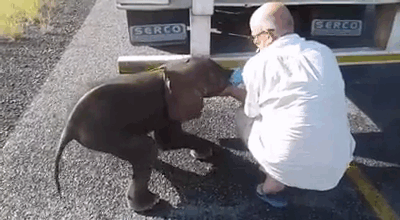
The heartbreaking truth lay in the perilous state of elephant populations across Africa. Habitat destruction and poaching had led to the extinction of 144,000 elephants in the last ten years alone, as reported in a study spanning 15 African countries. The truckers, perhaps unknowingly, became unsung heroes challenging this grim reality. Their decision to transport the young elephant to a sanctuary offered a glimmer of hope amidst a crisis.
Botswana, the stage for this heartening tale, emerged as a character in its own right. With a population just over 2 million, this African gem stood as a testament to the coexistence of humanity and wildlife. In the eyes of experts, Botswana boasted one of the world’s most impressive, ethical, and caring wildlife conservation policies. The nation, despite its relatively small human population, was a haven for a staggering number of wild animals, particularly elephants.
According to NPR, Botswana claimed the title of the country with the largest elephant population on Earth, housing over 130,000 of these majestic creatures. The scale of this sanctuary, the haven they accidentally stumbled upon, added a touch of grandeur to the truckers’ spontaneous act of kindness.
Now, fast forward to an update from The Dodo, revealing that the once-thirsty and abandoned baby elephant, now a three-year-old, continues to thrive. Thanks to the compassion of those truckers, the elephant moved from Elephant Sands to another refuge, Elephants Without Borders. It’s a story with a happy ending, a narrative of redemption for a creature that began its life on the side of a Botswana road.
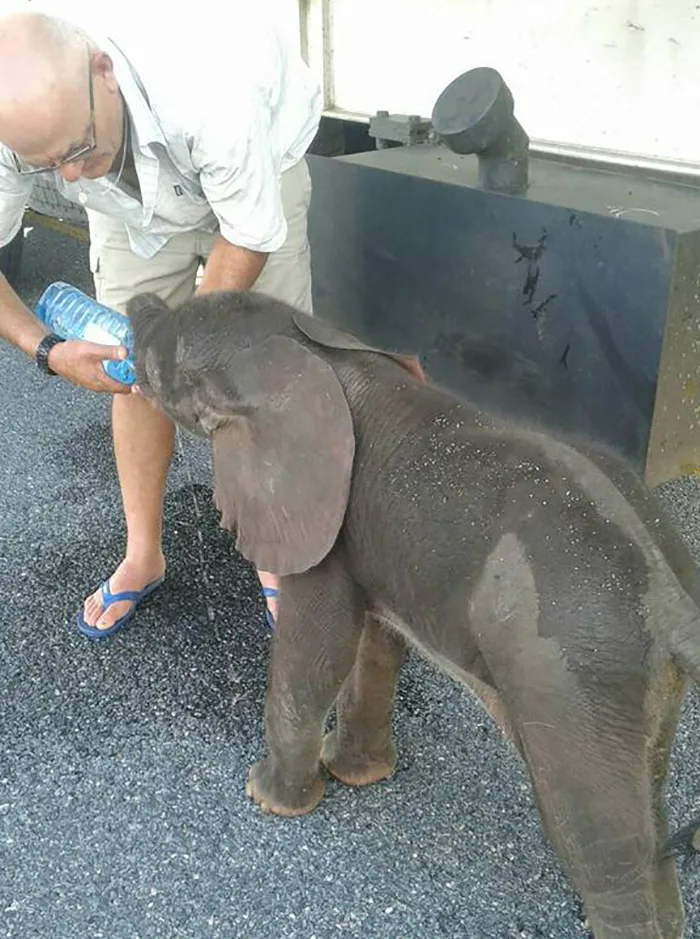
But let’s not conclude our journey of unexpected heroes just yet. Shift the scene to December 2020 in Thailand, where another chapter unfolded. Mana Srivate, a seasoned first responder with 26 years of experience, found himself in a uniquely challenging situation.
A motorcycle had collided with a baby elephant in the eastern province of Chanthaburi. Srivate, arriving at the scene, faced a delicate scenario. The baby elephant lay unconscious, and the motorcyclist miraculously escaped unharmed. However, the real danger lurked in the form of nearby elephants, the family of the injured baby.
In Srivate’s own words, he described the tense situation: “I have the instinct to rescue lives, but I was concerned the entire time since I could hear the mother and other elephants wailing for the youngster.” The potential danger escalated if the mother elephant noticed a human tending to her injured child.
Adding to the challenge, Srivate had never performed CPR on an elephant before. In a moment of quick thinking, he admitted to assuming the position of an elephant’s heart based on human anatomy and a video clip he had seen online. As he administered CPR and kept a vigilant eye on the approaching adult elephants, the stakes couldn’t have been higher.
In a heart-stopping turn of events, Srivate’s efforts proved successful. The baby elephant moved, and the relief in Srivate’s words echoed his triumph: “I almost cried when the baby elephant moved.” This wasn’t just a story of a first responder saving an animal; it was a testament to human ingenuity and compassion.
The baby elephant not only survived but reunited with its mother, marking a triumph against the odds. Srivate’s ability to handle a potentially fatal circumstance with rapid thinking and decisive action painted him as a real-life hero in the Thai wilderness.
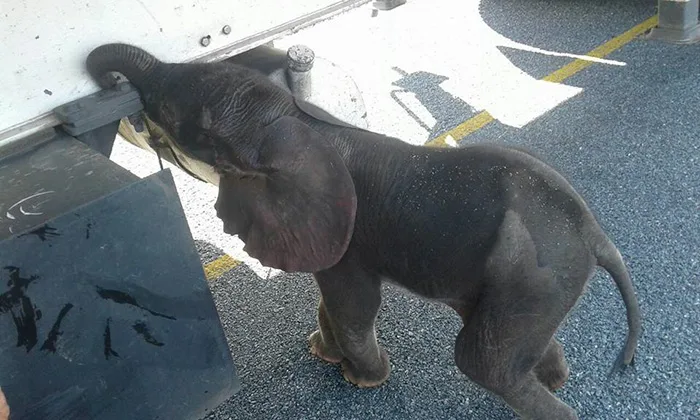
So, what’s the common thread weaving through these tales of truckers and first responders turning into unlikely heroes? Is it just coincidence, or is there a larger message at play? Perhaps it’s a reminder that heroes aren’t always the ones wearing capes and masks. Sometimes, they’re ordinary individuals on the road, navigating through life’s unexpected detours, ready to respond with kindness and courage.
In a world where bridges break, elephants roam, and motorcycles collide with nature’s wonders, these stories shine a light on the power of compassion and quick thinking. The truckers showcased that a routine workday could transform into an extraordinary adventure, and Srivate demonstrated that even a seasoned first responder can face new challenges, rising above them with grace.
As we salute these everyday heroes, whether behind the wheel of a truck or administering CPR in the wild, let’s remember that the world is full of unsung champions. The next time you encounter a trucker on the road or witness the selfless actions of a first responder, give a nod to these heroes who, in their own ways, turn ordinary moments into extraordinary tales of compassion and bravery.


